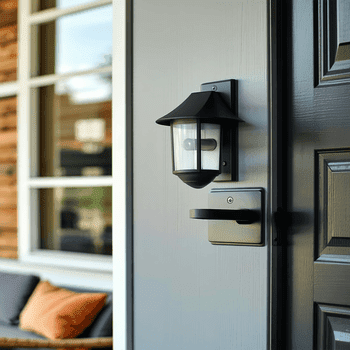
Living as an expat in China presents unique security challenges that require understanding local regulations, cultural norms, and available technologies.
While China maintains relatively low crime rates with 0.53 homicides per 100,000 people compared to global averages, property crimes and digital security threats still affect foreign residents.
This comprehensive guide addresses China-specific security concerns and practical solutions for expats.
Understanding China’s Security Landscape for Expats
Crime Statistics and Common Threats
China’s overall crime rates remain low, but expats face specific vulnerabilities:
| Risk Type | Frequency | Primary Targets | Peak Seasons |
|---|---|---|---|
| Residential Burglary | Moderate | Ground floor apartments, poor lighting | Spring Festival, Summer holidays |
| Rental Scams | High | New arrivals, premium locations | August-September (university season) |
| Digital Fraud | High | WeChat/Alipay users | Year-round |
| Package Theft | Moderate | Delivery-heavy areas | 11.11, 12.12 shopping festivals |
Legal Framework for Expat Security
Understanding Chinese law is crucial for implementing security measures:
- Surveillance Equipment: Cameras pointing toward public areas or neighbors’ properties require approval
- VPN Usage: While commonly used, VPNs exist in a legal gray area – use reputable services
- Property Modifications: Rental agreements typically restrict security installations without landlord consent
- Data Protection: China’s Cybersecurity Law affects how personal data is stored and transmitted
Source: Ministry of Public Security Annual Crime Statistics, 2024
Choosing Secure Housing in China
Residential Security Features Comparison
| Housing Type | Security Level | Average Monthly Cost (CNY) | Pros | Cons |
|---|---|---|---|---|
| Serviced Apartments | High | 8,000-15,000 | 24/7 security, maintenance | Expensive, limited locations |
| Gated Communities | High | 4,000-12,000 | Guards, CCTV, controlled access | Language barriers with security |
| Regular Apartments | Medium | 2,000-8,000 | Affordable, flexible | Varying security standards |
| Traditional Compounds | Low-Medium | 1,500-4,000 | Cultural experience, low cost | Limited modern security |
Key Questions for Landlords (Chinese Phrases Included)
- “小区有保安吗?” (Does the community have security guards?)
- “可以安装门锁吗?” (Can I install door locks?)
- “楼道有监控摄像头吗?” (Are there CCTV cameras in the building?)
Door and Window Security Solutions
Approved Security Upgrades for Renters
Most landlords in China permit these modifications:
Smart Locks Available in China:
- Xiaomi Smart Lock Pro: ¥1,299 – Fingerprint, password, app control
- Philips Smart Lock: ¥2,199 – Multiple access methods, Chinese app support
- TCL Smart Lock: ¥899 – Budget option with basic features
Window Security Options:
- Security film: ¥30-50 per square meter (legal in all provinces)
- Window sensors: ¥89-150 per unit (Aqara, Xiaomi brands)
- Safety bars: Require building management approval
Installation Services: Use apps like 58同城 (58.com) or 闲鱼 (Xianyu) to find certified locksmiths
Cultural Considerations
Chinese neighbors may be curious about extensive security measures. Consider:
- Explaining upgrades as “convenience features” rather than security concerns
- Choosing discrete cameras that don’t appear surveillance-heavy
- Consulting building management before major installations
Home Security Systems: China-Specific Options
Recommended Security Brands for China Market
| Brand | Availability | App Language | Cloud Storage | Government Compliance |
|---|---|---|---|---|
| Hikvision | Excellent | Chinese/English | China servers only | Full compliance |
| Xiaomi | Excellent | Multi-language | Global/China options | Full compliance |
| Arlo | Limited | English only | Global servers | Restricted features |
| Ring | Not available | N/A | Blocked in China | Not compliant |
Installation and Monitoring
Professional Installation Services:
- 京东安装服务 (JD Installation): Nationwide coverage, English support
- 苏宁帮客 (Suning): Major cities only
- Local 师傅 (Shifu) services: Cost-effective, Chinese only
Monitoring Options:
- Self-monitoring via mobile apps (most common)
- Local security companies (语言障碍 – language barrier consideration)
- Building management integration (where available)
Important: Foreign-operated monitoring services are generally not available due to data localization requirements.
Digital Security for Expats in China
VPN and Internet Security
Legal Status Update 2025: While individual VPN use isn’t actively prosecuted, businesses face restrictions. Recommended approaches:
Reliable VPN Services for Expats:
- ExpressVPN: Strong China performance, frequent server updates
- NordVPN: Specialized China servers, good customer support
- Surfshark: Budget option with decent reliability
Digital Security Checklist:
- Use strong, unique passwords for Chinese apps (WeChat, Alipay, Dianping)
- Enable two-factor authentication where available
- Regularly update smart home device firmware
- Backup important documents to both local and overseas cloud storage
Smart Home Integration Challenges
Great Firewall Impact:
- Google Home, Alexa: Limited functionality
- Apple HomeKit: Works with Chinese-sold devices
- Chinese ecosystems (Xiaomi, Aqara): Full functionality, privacy considerations
Insurance and Financial Protection
Home Insurance Options for Expats
| Provider | Coverage Type | Annual Premium (CNY) | English Support |
|---|---|---|---|
| PICC | Comprehensive | 800-2,000 | Limited |
| China Life | Basic coverage | 400-1,200 | Yes |
| International insurers | Full coverage | 2,000-5,000 | Excellent |
What’s Typically Covered:
- Theft of personal belongings: Up to ¥100,000
- Property damage: Varies by policy
- Temporary accommodation: ¥200-500/day
Note: Many standard Chinese policies exclude certain electronics and may have language barriers for claims.
Emergency Preparedness for Expats
Essential Emergency Contacts
Immediate Response:
- Police: 110 (24/7, some English support in major cities)
- Fire: 119
- Medical: 120
Key Phrases for Emergencies:
- “我是外国人,需要帮助” (I’m a foreigner and need help)
- “有人闯入我家” (Someone broke into my home)
- “我需要英语服务” (I need English service)
Embassy Contacts (Major Countries):
- US Embassy Beijing: +86-10-8531-3000
- UK Embassy Beijing: +86-10-5192-4000
- Canadian Embassy Beijing: +86-10-5139-4000
- Australian Embassy Beijing: +86-10-5140-4111
Building Relationships for Security
Community Integration Tips:
- Attend 业主大会 (owners’ meetings) if eligible
- Use WeChat neighborhood groups for security updates
- Offer small gifts during Chinese New Year to security guards
- Learn basic Chinese phrases for security-related conversations
Cost Analysis: Security Investment for Expats
Budget Security Setup (¥2,000-5,000)
- Smart lock: ¥1,200
- Basic security cameras (2): ¥800
- Window sensors: ¥300
- VPN subscription: ¥500/year
- Basic insurance: ¥600/year
Premium Security Setup (¥8,000-15,000)
- High-end smart lock with multiple access methods: ¥2,500
- Professional camera system with storage: ¥4,000
- Smart home integration: ¥2,000
- Comprehensive insurance: ¥3,000/year
- Professional monitoring service: ¥2,400/year
Seasonal Security Considerations
Spring Festival (January/February):
- Increased package theft due to delivery surge
- Building security may be reduced
- Neighbor travel creates surveillance gaps
Summer Months (June-August):
- Higher burglary rates due to open windows
- Increased maintenance scams targeting expats
- Student housing turnover creates security vulnerabilities
Legal Compliance and Best Practices
Avoiding Common Legal Issues
Photography and Surveillance Laws:
- Cameras must not record audio in public areas
- Neighbor consent required for cameras viewing shared spaces
- Regular privacy audits recommended
Data Storage Requirements:
- Personal security footage should remain in China
- Cloud storage services must comply with Chinese data laws
- Regular data deletion recommended (90-day retention maximum)
Conclusion
Effective home security for expats in China requires balancing international security standards with local regulations and cultural sensitivity.
By understanding the unique challenges, leveraging China-specific solutions, and maintaining compliance with local laws, expats can create secure living environments while respecting their host country’s requirements.
Key Takeaways:
- Prioritize legal compliance over maximum security
- Integrate with local community for enhanced safety
- Invest in recognized Chinese brands for reliability
- Maintain both digital and physical security measures
- Prepare for language barriers in emergency situations
Recommended Next Steps:
- Assess your current housing security level
- Research local regulations in your specific city
- Consult with building management before installations
- Establish relationships with neighbors and security personnel
- Create an emergency response plan in Chinese and English
Sources:
- Ministry of Public Security, People’s Republic of China Crime Statistics 2024
- China Internet Network Information Center (CNNIC) Security Reports
- Beijing Municipal Public Security Bureau Expat Safety Guidelines
- Shanghai Public Security Bureau Foreign Resident Security Manual
External Resources:



